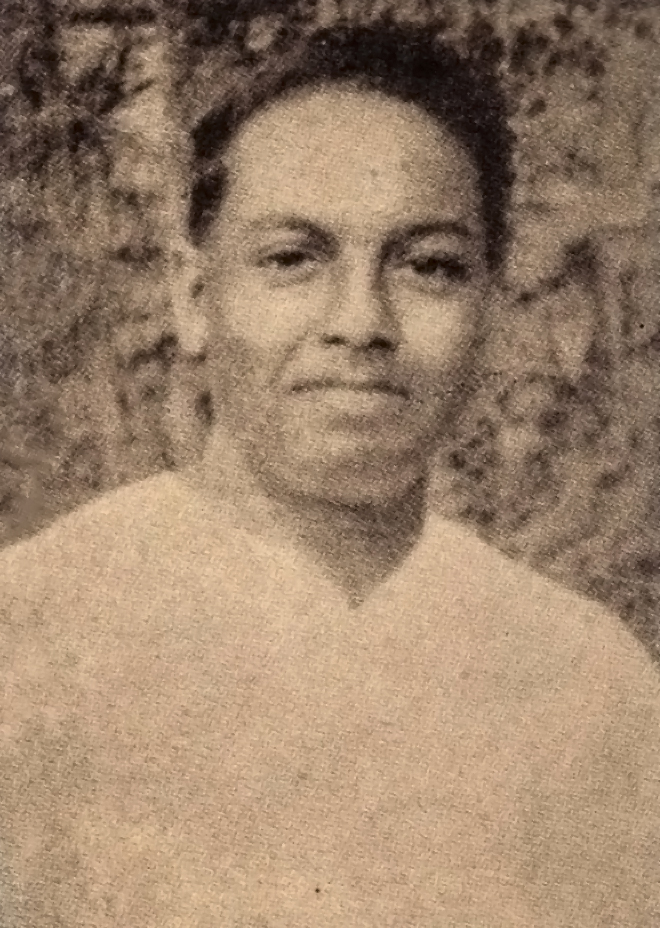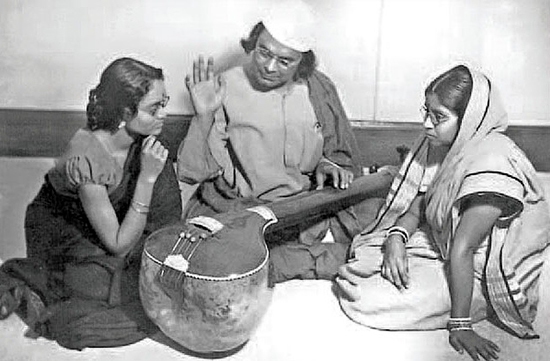|
Jibanananda Das
Jibanananda Das () (17 February 1899 – 22 October 1954) was an Indian poet, writer, novelist and essayist in the Bengali language. Popularly called "Rupashi Banglar Kabi'' ('Poet of Beautiful Bengal'), Das is the most read poet after Rabindranath Tagore and Kazi Nazrul Islam in Bangladesh and West Bengal. While not particularly well recognised during his lifetime, today Das is acknowledged as one of the greatest poets in the Bengali language. Born in Barisal to a Vaidya-Brahmo Samaj, Brahmo family, Das studied English literature at Presidency College, Kolkata and earned his MA from Calcutta University. He had a troubling career and suffered financial hardship throughout his life. He taught at many colleges but was never granted tenure. He settled in Kolkata after the partition of India. Das died on 22 October 1954, eight days after being hit by a tramcar. The witnesses said that though the tramcar whistled, he did not stop, and got struck. Some deem the accident as an attempt ... [...More Info...] [...Related Items...] OR: [Wikipedia] [Google] [Baidu] |
Bodh (poem)
"Bodh" ( bn, বোধ, in Clinton B. Seely's English translation "Sensation" and Fakrul Alam's "An Overwhelming Sensation") is a celebrated Bengali language, Bengali poem written by Jibanananda Das in 1930. It was first published in the literary magazine ''Pragati'' in 1336 of Bengali calendar. The poem was later included in Jibanananda Das' poetry book ''Dhushor Pandulipi (The Grey Manuscript)'' published in 1936. Clinton B. Seely wrote that in "Sensation", Jibanananda gives his readers an account of the burden he bore, the creative process conceived of as a presence, a constant companion, and not always a welcomed one: Prof. Alam opined that the poem is "about a man overwhelmed by the poetic fit and, indeed, consumed by it." Into the half light and shadow go I. Within my head Not a dream, but some sensation works its will. Not a dream, not peace, not love, A sensation born in my very being. I cannot escape it For it puts its hand in mine, And all else pales to insignificance� ... [...More Info...] [...Related Items...] OR: [Wikipedia] [Google] [Baidu] |
Kusumkumari Das
Kusumkumari Das (1875–1948) was a Bengali poet, writer and social activist. She is known as a poet and mother of Jibanananda Das, the eminent poet of modern Bengali literature and also served as the secretary of Barishal Women Society. Biography She was educated at Calcutta Bethune School. At the age of 19, she was married to Satyananda Das in 1894 and bore him two sons (Jibanananda Das and Ashokananda Das) and a daughter (Sucharita Das). She inherited the habit of writing from her father, Chandranath Das. Her father used to write light verses. She published poems in several magazines, among them were ''Mukul'', ''Brahmabadi'' and ''Pravasii''. She used to keep journals regularly. But most of them could not found because they were either lost or damaged by herself. Her famous poem is "Adarsha Chele", in English, "the Exemplary Boy" or "the Ideal Boy". The first two lines of this poem gained legendary status: আমাদের দেশে হবে সেই ছেলে ... [...More Info...] [...Related Items...] OR: [Wikipedia] [Google] [Baidu] |
Ruposhi Bangla
''Ruposhi Bangla'' ( bn, রূপসী বাংলা, Beautiful Bengal) is the most popular collection of poems by Jibanananda Das, the great modern Bengali poet. Written in 1934, the sixty-two sonnets - discovered in an exercise-book twenty years after Das wrote them - achieved instant popularity on their posthumous publication in 1957, becoming a totemic symbol of freedom in Bangladesh's 1971 War of Independence. In ''Ruposhi Bangla,'' Das seamlessly blends in both real and mythical historical figures, as well as mythical creatures such as the ''shuk'' bird, weaving a tapestry of a beautiful, dreamlike Bengal The poems celebrate the beauty of Barishal. In these poems infused with a scent of unrequited love, Jibanananda Das captured his country's soul through evocations of village life and natural beauty. Satyajit Ray Satyajit Ray (; 2 May 1921 – 23 April 1992) was an Indian director, screenwriter, documentary filmmaker, author, essayist, lyricist, magazine ed ... [...More Info...] [...Related Items...] OR: [Wikipedia] [Google] [Baidu] |
Tramcar
A tram (called a streetcar or trolley in North America) is a rail vehicle that travels on tramway tracks on public urban streets; some include segments on segregated right-of-way. The tramlines or networks operated as public transport are called tramways or simply trams/streetcars. Many recently built tramways use the contemporary term light rail. The vehicles are called streetcars or trolleys (not to be confused with trolleybus) in North America and trams or tramcars elsewhere. The first two terms are often used interchangeably in the United States, with ''trolley'' being the preferred term in the eastern US and ''streetcar'' in the western US. ''Streetcar'' or ''tramway'' are preferred in Canada. In parts of the United States, internally powered buses made to resemble a streetcar are often referred to as "trolleys". To avoid further confusion with trolley buses, the American Public Transportation Association (APTA) refers to them as "trolley-replica buses". In the United ... [...More Info...] [...Related Items...] OR: [Wikipedia] [Google] [Baidu] |
Asiatic Society Of Bangladesh
The Asiatic Society of Bangladesh is a non political and non profit research organisation registered under both Society Act of 1864 and NGO Bureau, Government of Bangladesh. The Asiatic Society of Bangladesh was established as the Asiatic Society of East Pakistan in Dhaka in 1952 by a number of Muslim leaders, and renamed in 1972. Ahmed Hasan Dani, a noted Muslim historian and archaeologist of Pakistan played an important role in founding this society. He was assisted by Muhammad Shahidullah, a Bengali linguist. The society is housed in Nimtali, walking distance from the Curzon Hall of Dhaka University, locality of Old Dhaka. Publications The society's publications include: * ''Banglapedia, the National Encyclopedia of Bangladesh'' (edition 2, 2012) * ''Encyclopedia of Flora and Fauna of Bangladesh'' (2010, 28 volumes) * ''Cultural Survey of Bangladesh, a documentation of the country's cultural history, tradition and heritage'' (2008, 12 volumes) * ''Children’s Banglapedia'', a ... [...More Info...] [...Related Items...] OR: [Wikipedia] [Google] [Baidu] |
The National Encyclopedia Of Bangladesh
''The'' () is a grammatical article in English, denoting persons or things already mentioned, under discussion, implied or otherwise presumed familiar to listeners, readers, or speakers. It is the definite article in English. ''The'' is the most frequently used word in the English language; studies and analyses of texts have found it to account for seven percent of all printed English-language words. It is derived from gendered articles in Old English which combined in Middle English and now has a single form used with pronouns of any gender. The word can be used with both singular and plural nouns, and with a noun that starts with any letter. This is different from many other languages, which have different forms of the definite article for different genders or numbers. Pronunciation In most dialects, "the" is pronounced as (with the voiced dental fricative followed by a schwa) when followed by a consonant sound, and as (homophone of pronoun ''thee'') when followed by a v ... [...More Info...] [...Related Items...] OR: [Wikipedia] [Google] [Baidu] |
Calcutta University
The University of Calcutta (informally known as Calcutta University; CU) is a public collegiate state university in India, located in Kolkata, West Bengal, India. Considered one of best state research university all over India every year, CU has topped among India's best universities several times. It has 151 affiliated undergraduate colleges and 16 institutes in Kolkata and nearby areas. It was established on 24 January 1857 and is the oldest multidisciplinary and European-style institution in Asia. Today, the university's jurisdiction is limited to a few districts of West Bengal, but at the time of establishment it had a catchment area, ranging from Lahore to Myanmar. Within India, it is recognized as a "Five-Star University" and accredited an "A+" grade by the National Assessment and Accreditation Council (NAAC). The University of Calcutta was awarded the status of "Centre with Potential for Excellence in Particular Area" and "University with potential for excellence" by t ... [...More Info...] [...Related Items...] OR: [Wikipedia] [Google] [Baidu] |
Presidency College, Kolkata
Presidency University, Kolkata (formerly known as Presidency College, Kolkata) is a second major public state aided research university located in College Street, Kolkata. Considered as one of best colleges when Presidency College was affiliated to University of Calcutta. Established in 1817, it is the oldest college in India (in Asia as well). It was formerly known as Hindu College and then Presidency College and now Presidency University. The institution was elevated to university status in 2010 after functioning as a top constituent college of the University of Calcutta for about 193 years. The university had its bicentenary celebrations in 2017. In its first cycle as a university, Presidency received A grade with a score of 3.04/4.00 by the NAAC. Presidency has been recognized as an "Institute of National Eminence" by the UGC. It appeared in the inaugural list of top 50 institutions of NIRF rankings in 2016. However, NIRF rankings in 2017 and 2018 excluded universiti ... [...More Info...] [...Related Items...] OR: [Wikipedia] [Google] [Baidu] |
Brahmo Samaj
Brahmo Samaj ( bn, ব্রহ্ম সমাজ, Brahmô Sômaj, ) is the societal component of Brahmoism, which began as a monotheistic reformist movement of the Hindu religion that appeared during the Bengal Renaissance. It was one of the most influential religious movements in India and made a significant contribution to the making of modern India. It was started at Calcutta on 20 August 1828 by Raja Ram Mohan Roy and Dwarkanath Tagore as reformation of the prevailing Brahmanism of the time (specifically Kulin practices) and began the Bengal Renaissance of the 19th century pioneering all religious, social and educational advance of the Hindu community in the 19th century. Its Trust Deed was made in 1830 formalising its inception and it was duly and publicly inaugurated in January 1830 by the consecration of the first house of prayer, now known as the Adi Brahmo Samaj. From the ''Brahmo Samaj'' springs Brahmoism, the most recent of legally recognised religions in India an ... [...More Info...] [...Related Items...] OR: [Wikipedia] [Google] [Baidu] |
West Bengal
West Bengal (, Bengali: ''Poshchim Bongo'', , abbr. WB) is a state in the eastern portion of India. It is situated along the Bay of Bengal, along with a population of over 91 million inhabitants within an area of . West Bengal is the fourth-most populous and thirteenth-largest state by area in India, as well as the eighth-most populous country subdivision of the world. As a part of the Bengal region of the Indian subcontinent, it borders Bangladesh in the east, and Nepal and Bhutan in the north. It also borders the Indian states of Odisha, Jharkhand, Bihar, Sikkim and Assam. The state capital is Kolkata, the third-largest metropolis, and seventh largest city by population in India. West Bengal includes the Darjeeling Himalayan hill region, the Ganges delta, the Rarh region, the coastal Sundarbans and the Bay of Bengal. The state's main ethnic group are the Bengalis, with the Bengali Hindus forming the demographic majority. The area's early history featured a succession ... [...More Info...] [...Related Items...] OR: [Wikipedia] [Google] [Baidu] |
Kazi Nazrul Islam
Kazi Nazrul Islam ( bn, কাজী নজরুল ইসলাম, ; 24 May 1899 – 29 August 1976) was a Bengali poet, Bengali literature, writer, Bangladeshi music, musician, and is the national poet of Bangladesh. Nazrul is regarded as one of the greatest poets in Bengali literature. Popularly known as Nazrul, he produced a Complete Works of Kazi Nazrul Islam, large body of poetry, music, messages, novels, stories, etc. with themes that included equality, justice, anti-imperialism, humanity, rebellion against oppression and religious devotion. Nazrul's activism for political and social justice as well as writing a poem titled as "Bidrohī", meaning "the rebel" in Bengali, earned him the title of "Bidrohī Kôbi" (''Rebel Poet''). His compositions form the avant-garde music genre of Nazrul Geeti, Nazrul Gīti (''Music of Nazrul''). Born into a Bengali Muslim Qadi#IndoPak Region, Kazi family hailing from Bardhaman district, Burdwan district in Bengal Presidency (now in West Be ... [...More Info...] [...Related Items...] OR: [Wikipedia] [Google] [Baidu] |
Rabindranath Tagore
Rabindranath Tagore (; bn, রবীন্দ্রনাথ ঠাকুর; 7 May 1861 – 7 August 1941) was a Bengali polymath who worked as a poet, writer, playwright, composer, philosopher, social reformer and painter. He reshaped Bengali literature and music as well as Indian art with Contextual Modernism in the late 19th and early 20th centuries. Author of the "profoundly sensitive, fresh and beautiful" poetry of ''Gitanjali'', he became in 1913 the first non-European and the first lyricist to win the Nobel Prize in Literature. Tagore's poetic songs were viewed as spiritual and mercurial; however, his "elegant prose and magical poetry" remain largely unknown outside Bengal. He was a fellow of the Royal Asiatic Society. Referred to as "the Bard of Bengal", Tagore was known by sobriquets: Gurudev, Kobiguru, Biswakobi. A Bengali Brahmin from Calcutta with ancestral gentry roots in Burdwan district* * * and Jessore, Tagore wrote poetry as an eight-yea ... [...More Info...] [...Related Items...] OR: [Wikipedia] [Google] [Baidu] |



.png)

.jpg)

